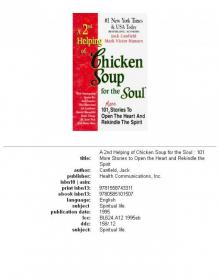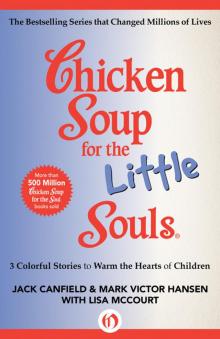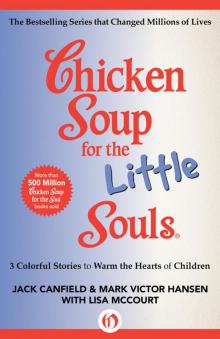- Home
- Jack Canfield
Chicken Soup for the Ocean Lover's Soul Page 2
Chicken Soup for the Ocean Lover's Soul Read online
Page 2
Best fishes and aloha,
Wyland
Share with Us
We would love to hear your reactions to the stories in this book. Please let us know what your favorite stories were and how they affected you.
We also invite you to send us stories you would like to see published in future editions of Chicken Soup for the Soul. Please send submissions to:
Chicken Soup for the Soul
P.O. Box 30880
Santa Barbara, CA 93130
fax: 805-563-2945
You can also visit or access e-mail at the Chicken Soup for the Soul site:
www.chickensoup.com
We hope you enjoy reading this book as much as we enjoyed compiling, editing and writing it.
1
LIVING IN HARMONY
All good things are wild and free.
Henry David Thoreau
Raising Cecily
Until one has loved an animal, a part of one’s soul remains unawakened.
Anatole France
On a chilly, gray morning in late May, the insistent ringing of the phone brought me dashing up from the garden. It was Bob, my husband, who was working on a summer cottage near our home on Mount Desert Island, Maine.
“Nan, get the kids and come over here,” he said. “There’s something you should see.”
Glad for the excuse to escape the blackflies, I loaded the kids into the car and drove the short distance to the cottage.
The “something” turned out to be a harbor seal pup—a forlorn and furry little bundle huddled against a large rock at the high-tide line. My first instinct was to offer immediate aid and comfort to the frightened creature, as one would any lost baby, but I knew better and resisted the urge.
Most seal pups that people find “abandoned” on reefs, rocks and beaches are not abandoned at all; they are merely waiting for their mothers to return from fishing. Although it is unusual for their mothers to leave them on a mainland beach, it isn’t unheard-of.
Bob and I decided to call the Department of Wildlife to ask what we should do. The local game warden told us to wait for a complete tide change—about six hours—to see if the pup’s mother returned. With no sighting of the mother, we called Steve Katona, director of Allied Whale, a marine research program at College of the Atlantic in nearby Bar Harbor. Steve gave us permission to foster the pup ourselves, under his supervision, until it was healthy enough to be returned to the wild.
We wrapped the shivering little pup, whom we had already named Cecily, into a wool blanket and carried her home. After laying her down on a tarp in the spare bedroom, I went to prepare the formula Steve had dictated to me—a rich concoction of cream, egg yolks, fish oil and baby vitamins. Steve had warned me that few abandoned seal pups survive—either because they are sickly to begin with or because they refuse to nurse from a bottle designed for human babies. Eager to help the starving pup, I never even considered failure.
But three hours later, with both of us reeking of fish oil and cream and crying—Cecily with hunger and I with frustration—I had to concede I was losing this life-and-death struggle. Although Cecily sucked hungrily on my arms, legs and fingers when I poured the formula on them, she refused to have anything to do with the rubber nipple on the bottle.
In a last attempt, I removed the offending nipple and replaced it with a triangular piece of sponge. Then tucking the bottle into the crook of my elbow with the sponge barely protruding from the other side, I squeezed a steady stream of formula down the outside of my arm. Cecily lapped at the formula, nuzzling closer and closer to the hidden sponge nipple. Finally, she latched onto the sponge and drained the bottle. Then, with considerable gusto, she finished a second one.
Weak-kneed and shaking, I stumbled upstairs to say goodnight to my children. As I leaned over to kiss my son, he wrinkled his nose and told me I smelled like fish bait. “That,” I told him, “is the sweet smell of victory.” It was a smell that grew quickly familiar. Every four hours from then on, Cecily would announce her hunger with loud whoops from the spare bedroom.
Cecily gained weight rapidly in the days that followed. Her body, which had resembled a stuffed toy with half the stuffing missing, had filled out like a fat little blimp, and her dark, dappled fur grew thick and glossy.
She had bonded with me completely after that first feeding, just as she would have with her own mother. She tolerated occasional pats from Bob and the kids, but most of her waking hours were spent at my feet with one flipper wrapped around my ankle. She even terrorized our seventy-five-pound malamute and our cat with warning snorts and sneezes whenever either of them dared approach “mom territory.”
Cecily had gained about ten pounds in less than a week on the fat-rich formula, and Steve Katona suggested I try her out in the ocean. Although I realized swimming was a necessary part of her education, I dreaded the moment. I was worried that as soon as she tasted the salty water and felt the compelling currents wash against her flippers, she would disappear, like a bird from a cage, into a sea she was not yet equipped to survive.
I needn’t have worried. Cecily’s response when I gently placed her in the water of Pretty Marsh Harbor near our home was a series of distressed barks and snorts and a valiant attempt at climbing up my legs to escape the horrible wet stuff. My thoughts went instantly from worrying about a premature dash for freedom to what I would do with a seal who hated the sea.
Twice a day I drove Cecily to the harbor and led her into the ocean, hoping she would eventually acquire a taste for the aquatic life, but she made little progress. At her most daring she would uncurl her flippers from around my achingly cold legs and swim around me in tight circles like a fat little shark. But as soon as I tried to sneak out of the water, she was at my heels.
It was clear that Cecily was not going to be doing any serious swimming without me at her side, and it was equally clear that with the water temperature at about fifty-two degrees I wasn’t going to be giving any oceanic swimming lessons. I did think I might tolerate the slightly warmer lake water and wondered if fresh water was harmful to seals. Steve Katona assured me she would be fine as long as I dunked her in the ocean afterward.
The following morning I drove Cecily to a secluded area on a large lake near our home. At first she retreated as she had in the harbor—clinging to me or, at most, making quick shallow dives to investigate my toes. But she stayed by me as I waded deeper and, finally, plunged headfirst into the icy water. When I came up for air I found myself nose-to-nose with a very happy little seal. The expression on her puppylike face—her bead-black eyes and silly grin—said as clearly as words that she was thrilled to have finally coaxed me into the water!
I watched in admiring wonder as Cecily suddenly came into her own. Her two sets of flippers, which worked so clumsily on dry land, were transformed into wings. She flew through the water, performing belly rolls, nosedives and somersaults. She skimmed along the bottom like a submarine, then soared to the surface with an explosion of fine sparkling spray. After every stunt she’d swim back to me and nudge my cheek or shoulder with her whiskered nose as if to seek my approval.
Tired from treading water for more than a half-hour, I rolled over and floated on my back for a while. Cecily, too, must have been exhausted after all those athletic shenanigans and seized the opportunity to climb onto my belly, where she lay her head on my chest and fell asleep. In the wild, Cecily and her real mother would have let the ocean rock them like this for hours. As it was, I could only stand the cold lake for a few more minutes. This time when I walked out of the water, Cecily lingered for a while in the shallows, performing a couple more graceful belly rolls before lumbering back onto dry land.
For the next few weeks, the playful little seal and I led double lives. During the day I joined her in her watery world, either swimming with her in the lake or watching her frolic about in the harbor. She no longer needed my company when she swam and would play alone in the waves, occasionally encouraging me with raucous whoops to c
ome join her.
In the evening Cecily became part of my dry world. She often draped herself over my lap in the living room, nursing from her bottle and watching late-night TV with me.
It was an idyllic time. Somehow we had managed to find a happy compromise between her needs as an aquatic mammal and mine as a land mammal. I’m not sure what lasting lessons Cecily learned from The Tonight Show, but the wonders she showed me will stay with me forever.
While Cecily and I had been enjoying ourselves, a researcher had been observing a wild harbor seal colony off the shores of Mount Desert Island. She was monitoring the activities of the mothers and their pups and passing the information to me so I could base my behavior with Cecily on this model. When the researcher reported the mother seals were leaving their pups for longer and longer intervals, it was time for me to follow their example and start the painful separation of our two worlds.
Now I began taking Cecily down to the harbor in the mornings and leaving her there for four or five hours, at which time I would return with her afternoon bottle. Every lobsterman rowing into the dock those afternoons would see a wild-haired woman waving a pink plastic baby bottle at the sea and crying out, “Sessileeeee!”
It soon became apparent that Cecily had learned to catch and eat her own fish, since it took her longer and longer to respond to my calls, and she often didn’t seem that interested in the bottle—just the cuddle that came with it. When she was down to just two bottles a day, I started leaving her out all night. I missed our cozy sessions in front of the TV, but I had to accept that our two worlds were drifting apart.
“The mothers are weaning their pups,” the researcher reported. It was news I was both expecting and half hoping I would never hear. It meant it was time to wean Cecily from the bottle—and from me.
On a beautiful June morning, I picked Cecily up at the harbor for the last time. Instead of giving her the expected bottle, I drove her to a private cove facing the wild colony and—as the researcher had instructed—painted a yellow stripe on her back so she could identify Cecily from the dozens of other seal pups in the area. When I waded into the water, Cecily trailed after me, reminding me with plaintive little whoops that I had forgotten her bottle. While playing with her for the last time in the shallow water of the cove, I felt what any foster parent must feel as they return a child they have grown to love to the natural parent. I caught myself feeling angry with the harsh choice that had been forced upon me. Why couldn’t I just go on loving and caring for Cecily for the next twenty or thirty years?
Ultimately, though, it was Cecily who made the choice for me. Bored with my melancholic, halfhearted play, she decided to explore this new place I had brought her to and started swimming toward the open water. I desperately wanted to call her back, but I didn’t. Instead I watched as her little, black head glided out of the cove toward the wild colony and, I hoped, a new life.
Nan Lincoln
Surrogate Mom and Pup
Several years ago, on a cold and foggy morning in Monterey, a baby sea otter washed up on the shore of the Pacific Grove coastline, its mother nowhere in sight. The little otter had been discovered by a beachgoer who called in the field response team from the sea otter research and conservation program at the Monterey Bay Aquarium. After a thorough examination by a resident veterinarian, it was determined that the three-week-old pup was in shock and suffering from hypothermia. Even if it recovered, the veterinarian said that without a “mom” to teach it, its chances for survival in the wild were slim.
The otter, who became known as Elwood, was warmed and given antibiotics. When he finally regained consciousness, he let out a bloodcurdling cry that continued for hours on end. He wasn’t interested in the aquarium-made formula, and while he managed to choke down a few morsels of clam, rock cod and squid, all he seemed to really want was his mom. As his healing progressed, Elwood was moved to an outdoor tank where he could swim. But even there the desperate pup spent most of his time searching the tank for his mother, crying in hope of some response.
Jake, the other orphaned otter who shared Elwood’s tank, began to show signs of agitation from the cries, so Elwood was moved to a temporary nursery in the dive locker room on the third floor of the aquarium. Sleeping only thirty to forty minutes at a time, he continued to lament the loss of his mother. He refused contact with any human and was only quiet when he slept or ate.
Then fate intervened. While tagging sea otters to track and research for the aquarium’s field research project, a group of biologists tried to catch a battered female carrying a small pup. The feisty mother wriggled free at the last moment, but left the pup. Upon closer examination, the biologists discovered the pup had been dead for a day or so, the cause of death unknown. Not giving up, the mother swam around the boat, crying for the baby. The biologists tried to draw her nearer by placing the pup in the water, but the frightened otter only swam backward toward a bed of kelp, all the while calling for her baby. The team tried again. Again the otter evaded them until all the team could do was note the distinguishing nose scar and mottled color of the otter to identify her later.
That afternoon, a member of the team, researcher Michelle Staedler, returned to the aquarium nursery to find sea otter program supervisor Julie Hymer preparing for an evening shift with Elwood. Michelle had an idea. “Hey, Julie,” she said. “Do you want a mom for your pup?”
Julie looked skeptical.
“You’ve got one?” Julie said. “Just like that?”
“Maybe,” Michelle said. “We found an otter in the bay with a dead pup. We got the pup, but the mother got away. She’s swimming around the kelp screaming for her baby. And you’ve got a pup screaming for his mom. Why don’t we try to bring them together?”
It was almost evening. The team would have to work fast. Elwood was shuffled into a kennel, screaming at the top of his lungs, and moved onto the inflatable boat the team used. The team arrived at Lover’s Point, where the otter mom was last spotted. As the boat approached the point, Elwood’s cries caught the attention of the mother.
Elwood was placed in the water. He began to swim toward the otter. This was the moment of truth. The otter immediately placed Elwood on her belly and began to groom him as she moved through the kelp beds. Elwood even tried to nurse. Then the female dove. Because Elwood was still buoyant in his pup coat, he was unable to follow her under the water. All he could do was swim at the surface in the direction he thought the mother was heading. Julie, Michelle and the team wondered what to do. Did the mother abandon him when she realized he wasn’t hers? Could she even tell that it was the wrong pup? The adoption didn’t seem to be working. The team waited. If the female had lost interest, little Elwood would not survive the night alone in the bay. Disappointed, the team moved in to rescue him.
Suddenly, the mother reappeared at the surface, snatched Elwood under her paw and swam quickly away. In seconds, the pair was safely nestled amid the kelp beds in Lover’s Point. The team had done all it could do. Now it was up to Elwood’s adopted mother. Cautiously, the team moved away.
The next morning both Elwood and his new mom were spotted in the area off Lover’s Point. Elwood rode happily on her belly as she skulled backwards through the kelp beds. The team couldn’t believe it. Sea otter mom without pup, pup without mom—the match had been made. A new family had taken residence in Monterey Bay!
Roxayne Spruance and Michelle Staedler
Hooked on Mahogany
We share the Earth not only with our fellow human beings, but with all the other creatures.
Dalai Lama
Now that I’m old, I come to the dock with my poles and tackle, and I fish each day. There are always four or five pelicans that sit nearby on the pier and wait with great patience until I toss a fish their way. They have curious eyes with yellow irises and black pupils. Their bodies are a silvery brown, and their huge shovel mouths all seem identical. Almost all of the pelicans have large, arched necks that are white, but one is different. He seems
older, wiser, something like myself. He is the lone one with a deep brown neck. I’ve even named him; I call him Mahogany.
There are days when the tide is out and the water is very low, but I still come around to watch him swoop in and gently land on the planks. Some mornings I fish with squid for bait and quickly hook a fish that brings Mahogany to his feet. I hold it in my hand and try to coax him, get him close. But he’s a wild creature, and no amount of bribing can make him a friend. I guess I’m useful so long as I toss him a fish. Every morning we have a new encounter. One day my light pole was bending in half with the weight of a big fish. I saw Mahogany glide across the calm sea, drop daintily to the dock and watch the struggle that was going on.
The fish was tiring me, but it finally broke water, and I could see it was a hefty jack cravalle. As soon as it hit the deck, the fish and I were surrounded by a wave of young white-necked pelicans. They were in a frenzy for the jack, but calm old Mahogany just sat there and watched. I had to drive the birds away with a wave of my arms and then bucket the struggling fish. Mahogany never budged, and when the rest flew off, I cut the fish into chunks that I knew he could catch. I tossed piece after piece into his cavernous mouth, and when he finished the last, he slunk down and rested his bill on still-wet feathers. Two old men, he and I, still hanging on.
At the end of the day, I looked up and saw a flock of egrets that looked like a thousand white butterflies. Across the cove I could see the pelicans returning from yet another expedition. Like old bombers with outstretched wings, they circled a cluster of casuarina pines that grew out of the water. One by one the great birds lowered their flap feathers in midair, stalled and, with webbed landing gear down, shuddered to a halt on flimsy branches. At the top of the tallest tree I could see Mahogany preening his wings and fixing his gaze on me. I doffed my hat in tribute.

 Chicken Soup for the Nurse's Soul: Second Dose
Chicken Soup for the Nurse's Soul: Second Dose Chicken Soup for the Ocean Lover's Soul
Chicken Soup for the Ocean Lover's Soul A 2nd Helping of Chicken Soup for the Soul
A 2nd Helping of Chicken Soup for the Soul Chicken Soup for the Nurse's Soul
Chicken Soup for the Nurse's Soul Chicken Soup for the Breast Cancer Survivor's Soul
Chicken Soup for the Breast Cancer Survivor's Soul Chicken Soup for the Pet Lover's Soul
Chicken Soup for the Pet Lover's Soul Chicken Soup for the Bride's Soul
Chicken Soup for the Bride's Soul A Chicken Soup for the Soul Christmas
A Chicken Soup for the Soul Christmas Chicken Soup for the Soul of America
Chicken Soup for the Soul of America Chicken Soup for the Teenage Soul on Tough Stuff
Chicken Soup for the Teenage Soul on Tough Stuff A Taste of Chicken Soup for the Teenage Soul III
A Taste of Chicken Soup for the Teenage Soul III Chicken Soup for Every Mom's Soul
Chicken Soup for Every Mom's Soul Chicken Soup for the Dog Lover's Soul
Chicken Soup for the Dog Lover's Soul A Second Chicken Soup for the Woman's Soul
A Second Chicken Soup for the Woman's Soul Chicken Soup for the Soul the Book of Christmas Virtues
Chicken Soup for the Soul the Book of Christmas Virtues Chicken Soup for the Little Souls: 3 Colorful Stories to Warm the Hearts of Children
Chicken Soup for the Little Souls: 3 Colorful Stories to Warm the Hearts of Children Chicken Soup for the African American Woman's Soul
Chicken Soup for the African American Woman's Soul Chicken Soup for the Soul
Chicken Soup for the Soul Chicken Soup for the Soul Celebrates Teachers
Chicken Soup for the Soul Celebrates Teachers Chicken Soup for the College Soul
Chicken Soup for the College Soul Chicken Soup for the Recovering Soul Daily Inspirations
Chicken Soup for the Recovering Soul Daily Inspirations Chicken Soup for the Soul Celebrates Sisters
Chicken Soup for the Soul Celebrates Sisters Chicken Soup for the Dieter's Soul
Chicken Soup for the Dieter's Soul Chicken Soup for the Soul at Work 101 Stories of Courage
Chicken Soup for the Soul at Work 101 Stories of Courage Chicken Soup for the Beach Lover's Soul
Chicken Soup for the Beach Lover's Soul Stories About Facing Challenges, Realizing Dreams and Making a Difference
Stories About Facing Challenges, Realizing Dreams and Making a Difference Chicken Soup for the Teenage Soul II
Chicken Soup for the Teenage Soul II Chicken Soup for the Girl's Soul
Chicken Soup for the Girl's Soul Chicken Soup for the Kid's Soul: 101 Stories of Courage, Hope and Laughter
Chicken Soup for the Kid's Soul: 101 Stories of Courage, Hope and Laughter Chicken Soup for the Woman's Soul
Chicken Soup for the Woman's Soul Chicken Soup for the Cancer Survivor's Soul
Chicken Soup for the Cancer Survivor's Soul Chicken Soup for the Canadian Soul
Chicken Soup for the Canadian Soul Chicken Soup for the Military Wife's Soul
Chicken Soup for the Military Wife's Soul A 4th Course of Chicken Soup for the Soul
A 4th Course of Chicken Soup for the Soul Chicken Soup Unsinkable Soul
Chicken Soup Unsinkable Soul Chicken Soup for the Soul: Christmas Magic
Chicken Soup for the Soul: Christmas Magic Chicken Soup for the Grandma's Soul
Chicken Soup for the Grandma's Soul Chicken Soup for the Soul: All Your Favorite Original Stories
Chicken Soup for the Soul: All Your Favorite Original Stories Chicken Soup for the Expectant Mother's Soul
Chicken Soup for the Expectant Mother's Soul Chicken Soup for the African American Soul
Chicken Soup for the African American Soul 101 Stories of Changes, Choices and Growing Up for Kids Ages 9-13
101 Stories of Changes, Choices and Growing Up for Kids Ages 9-13 Christmas Magic
Christmas Magic Chicken Soup for the Soul: Children with Special Needs
Chicken Soup for the Soul: Children with Special Needs Chicken Soup for the Soul: Country Music: The Inspirational Stories behind 101 of Your Favorite Country Songs
Chicken Soup for the Soul: Country Music: The Inspirational Stories behind 101 of Your Favorite Country Songs Chicken Soup for the Country Soul
Chicken Soup for the Country Soul Chicken Soup for the Recovering Soul Daily Inspirations (Chicken Soup for the Soul)
Chicken Soup for the Recovering Soul Daily Inspirations (Chicken Soup for the Soul) A 3rd Serving of Chicken Soup for the Soul
A 3rd Serving of Chicken Soup for the Soul The Book of Christmas Virtues
The Book of Christmas Virtues Chicken Soup for the Soul at Work
Chicken Soup for the Soul at Work Chicken Soup for the Soul 20th Anniversary Edition
Chicken Soup for the Soul 20th Anniversary Edition Chicken Soup for the Little Souls
Chicken Soup for the Little Souls Chicken Soup for the Soul: Reader's Choice 20th Anniversary Edition
Chicken Soup for the Soul: Reader's Choice 20th Anniversary Edition Chicken Soup for the Soul Christmas
Chicken Soup for the Soul Christmas Taste of Chicken Soup for the Teenage Soul III
Taste of Chicken Soup for the Teenage Soul III Chicken Soup for the Unsinkable Soul
Chicken Soup for the Unsinkable Soul Chicken Soup for the Preteen Soul II
Chicken Soup for the Preteen Soul II